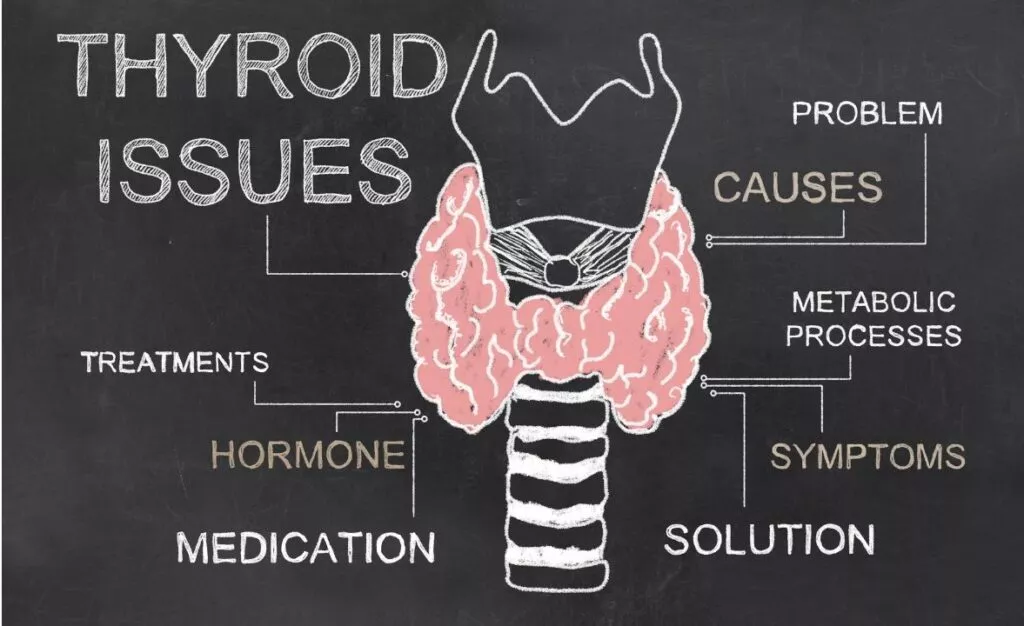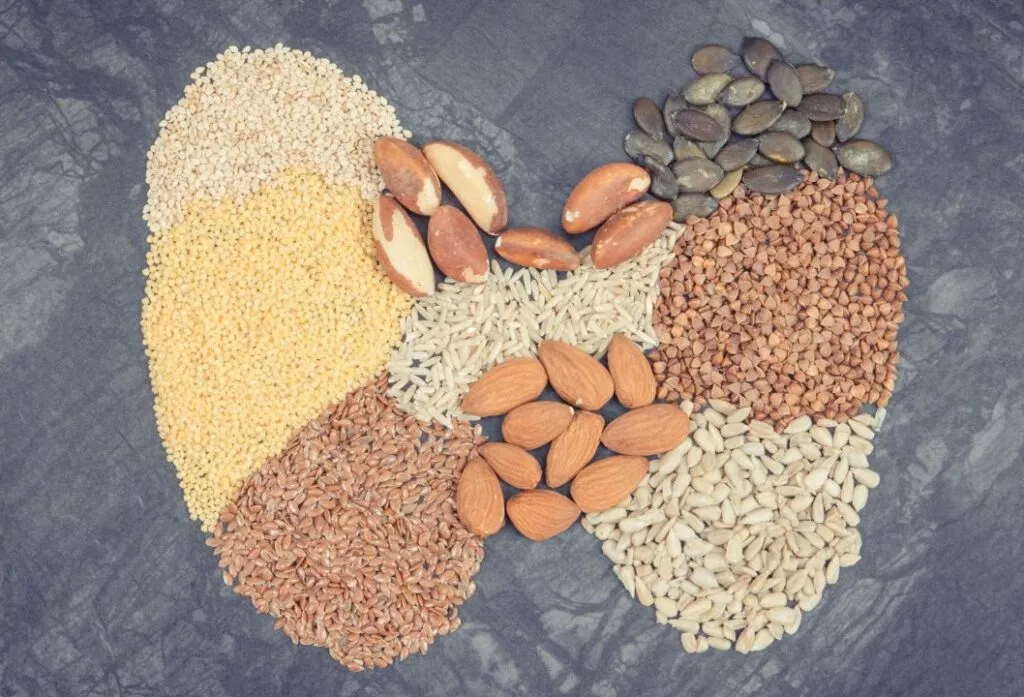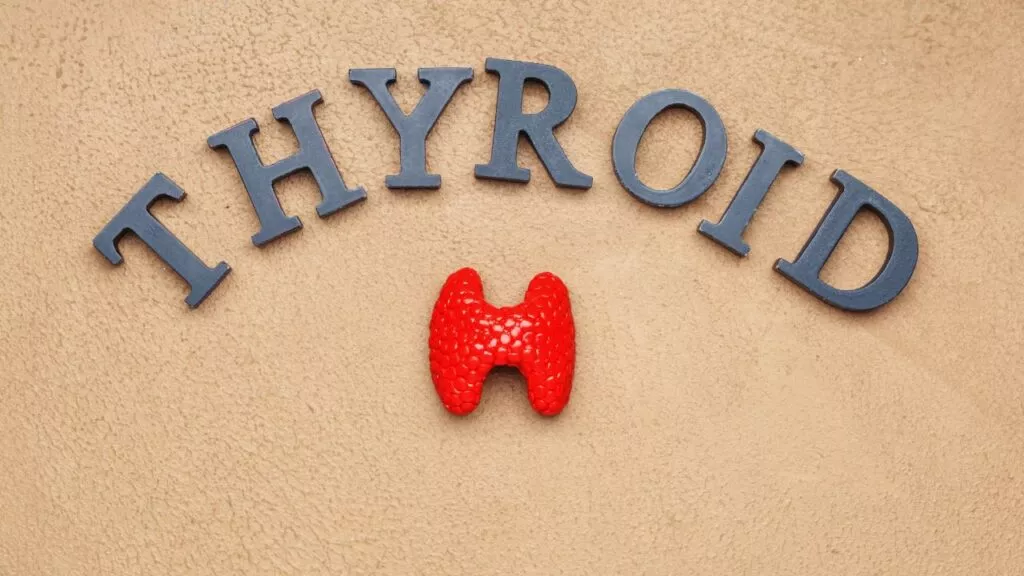The thyroid gland is a small butterfly-shaped gland, located in the neck, that plays a significant role in regulating metabolism, energy production, regulation of calcium, and overall health. The thyroid functions as an endocrine gland responsible for producing thyroid hormone and calcitonin.

When the thyroid gland isn’t functioning optimally, it can lead to various health issues, and may cause symptoms like a puffy face, sluggishness, weight gain, difficulty losing weight, feeling cold, a slowed heart rate, constipation, depression, and thinning of hair. Fortunately, adopting specific nutrition strategies can support thyroid health and facilitate weight loss.
In this comprehensive guide, we’ll explore effective nutrition strategies for optimizing thyroid health and achieving weight loss goals.
Understanding Thyroid Functioning
Before diving into nutrition strategies, one must grasp the basics of thyroid health. The thyroid gland produces mainly 2 hormones—thyroxine (T4) and triiodothyronine (T3)—that regulate metabolism and influence various bodily functions. Conditions such as hypothyroidism (underactive thyroid) or hyperthyroidism (overactive thyroid) are because of disruption in these hormone levels, leading to metabolic imbalances and weight fluctuations.
Causes of Hypothyroidism
- Congenital deficiency
- Iodine deficiency in the diet
- Inflammation
- Autoimmune condition
- Removal of thyroid gland
- Certain drugs that depresses thyroid function
- Pregnancy induced hypothyroidism
- Poor gut health

Yes, an unhealthy gut can disrupt the thyroid functioning.
The relationship between both gut health and thyroid function is increasingly recognised as an important aspect of thyroid function. Imbalance in the gut microbiome can lead to inflammation and dysfunction within the digestive system. This, in turn, may disrupt the absorption of essential nutrients like Iodine,Selenium, Zinc, Vitamin D which are crucial for thyroid hormone production and regulation.
Additionally, gut health influences the conversion of inactive thyroid hormone (T4) to its active form (T3). Therefore, addressing gut health through proper diet, probiotics, and lifestyle changes can play a significant role in managing hypothyroidism effectively.

Nutrition Strategies for Thyroid Health and Weight Loss
Include Iodine-rich foods
Iodine is a key nutrient for thyroid function, as it’s a component of thyroid hormones. Choose iodine-fortified salts. Often, few salts perceived as healthy options such as Himalayan pink salt or black salt do not contain added iodine.
Therefore, you must include iodine-rich foods in your diet that can support thyroid health. Opt for sources like seaweed, iodized salt, fish (such as cod and tuna), dairy products, and eggs.
Emphasize nutrient-dense foods
Focus on consuming a variety of nutrient-dense foods to ensure you’re getting essential vitamins, minerals, and antioxidants.
Include plenty of fruits, vegetables, whole grains, lean proteins, low-fat or fat-free milk products, eggs, and healthy fats in your diet to nourish your body and support thyroid health.
Selenium-rich foods:
Selenium is another essential mineral that plays a vital role in thyroid health. The thyroid gland contains the highest amount of selenium per gram of tissue.
Many selenium-associated proteins have a wide range of functions and help protect the gland from inflammatory and oxidative damage. It also prevents thyroid-related cancers. Incorporate selenium-rich foods like Brazil nuts, sunflower seeds, fish (such as salmon and sardines), eggs, and poultry into your diet.
Iron and Zinc:
Iron is a crucial element necessary for the body to produce and process thyroid hormones. The body relies on iron to convert inactive thyroid hormone into its active form. In a research involving 94 adolescent girls with iron deficiency, those who received supplementation of both iodine and iron showed improved thyroid indicators compared to those who received only Iodine or only iron supplementation.
At the same time, Zinc is also essential for optimum immunity.
Including foods such as beans, nuts, dark chocolate, legumes, eggs, and spinach in your diet can support thyroid health.
Anti-Inflammatory foods
Chronic inflammation can negatively impact thyroid function. Incorporate anti-inflammatory foods such as fatty fish (e.g., salmon, mackerel), leafy greens, berries, turmeric, ginger, garlic, non-dairy fermented foods like kombucha, and olive oil into your diet and to help reduce inflammation and support thyroid health

Foods to Include
In addition to supporting thyroid health, certain foods can aid in weight loss efforts by promoting satiety, stabilizing blood sugar levels, and boosting metabolism. Here are some nutrient-rich options to include in your weight loss plan.
- Lean proteins like chicken, fish, tofu, tempeh, legumes, and Greek yogurt
- High-fiber foods like whole grains, fruits, vegetables, whole grains, beans, lentils, and nuts
- Healthy fats like avocados, nuts, seeds, olive oil, and fatty fish
- Complex carbohydrates like whole grains (e.g., quinoa, brown rice, oats), starchy vegetables (e.g., sweet potatoes, squash), and legumes.
- Herbal teas and water to decrease oxidative stress.
Foods to Avoid
While certain foods support thyroid health and weight loss, others may hinder progress or exacerbate thyroid issues. Here are some foods to limit or avoid:
- Processed Foods like sugary beverages, fast food, and packaged meals can contribute to inflammation and weight gain.
- Excessive Soy Products as soy contain goitrogens that may interfere with thyroid function if taken in large amounts. Moderate soy consumption is generally safe.
- Gluten-containing foods like wheat, rye, barley, and processed grains may trigger auto-immune thyroid conditions. such as wheat, barley, rye, and processed grains.
- Pearl millets also contain goitrogens.
- Caffeine and Alcohol can trigger stress response and imbalance in thyroid function. sleep patterns, stress hormones, and thyroid function.
- Refined Sugars as excessive sugar intake can lead to inflammation, insulin resistance, and weight gain.
- Trans Fats and Hydrogenated Oils also trigger inflammation and weight gain.
References
- https://www.ncbi.nlm.nih.gov/books/NBK470452/
- https://my.clevelandclinic.org/health/articles/22391-thyroid-hormone
- https://www.ncbi.nlm.nih.gov/pmc/articles/PMC7282437/
- https://www.btf-thyroid.org/iodine-and-thyroid
- https://www.ncbi.nlm.nih.gov/pmc/articles/PMC10080082/
- https://www.ncbi.nlm.nih.gov/pmc/articles/PMC10048267/
- https://www.ncbi.nlm.nih.gov/pmc/articles/PMC6166193/
- https://timesofindia.indiatimes.com/life-style/health-fitness/diet/thyroid-weight-loss-diet-best-foods-and-tips-for-thyroid-patients-to-lose-weight/articleshow/81310577.cms
- https://www.ncbi.nlm.nih.gov/books/NBK540969/
- https://www.health.com/food/the-best-and-worst-foods-for-your-thyroid
- www.ncbi.nlm.nih.gov/pmc/articles/PMC9571437/
- https://www.niddk.nih.gov/health-information/endocrine-diseases/hypothyroidism
- https://www.ncbi.nlm.nih.gov/pmc/articles/PMC7353203/
- https://www.ncbi.nlm.nih.gov/pmc/articles/PMC9433865/

